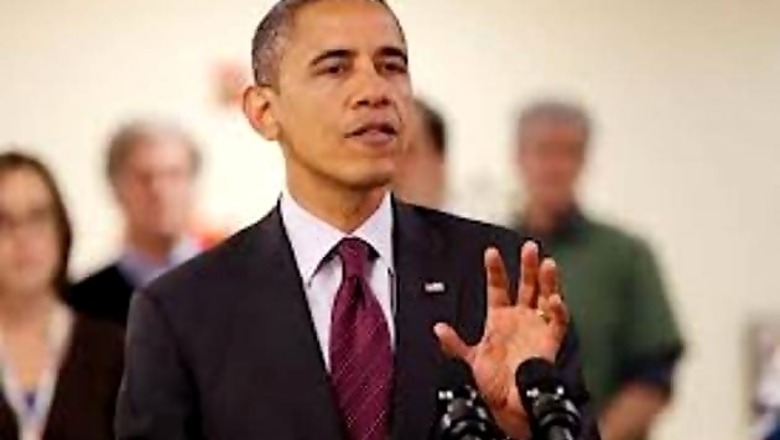
views
Washington: US President Barack Obama expressed deep concern about the Egyptian military's removal of President Mohamed Morsi on Wednesday but stopped short of condemning a move that could lead to a cut-off in US aid. Obama issued a written statement responding to dramatic events in Cairo after huddling with his top national security advisers at the White House. The session took place shortly after the Egyptian military made its move.
Obama stopped short of an outright condemnation of the intervention, which came amid growing concern among U.S. officials over Morsi's leadership. "The United States is monitoring the very fluid situation in Egypt, and we believe that ultimately the future of Egypt can only be determined by the Egyptian people. Nevertheless, we are deeply concerned by the decision of the Egyptian Armed Forces to remove President Mursi and suspend the Egyptian constitution," Obama said.
If the military move is deemed to be a coup, the United States would be obligated to cut off US military assistance to Egypt. Obama said the move is being reviewed by US agencies to determine the implications to US aid.
As reports surfaced that the Egyptian military had issued arrest warrants for 300 members of Morsi's Muslim Brotherhood political party, Obama urged the military to avoid "any arbitrary arrests of President Morsi and his supporters." "I now call on the Egyptian military to move quickly and responsibly to return full authority back to a democratically elected civilian government as soon as possible through an inclusive and transparent process," he said.
Minutes before Egypt's army commander announced that Mursi, the country's first democratically elected president, had been deposed and the constitution suspended, the U.S. State Department criticized Mursi, but gave no public signal it was opposed to the army's action. Asked whether the Egyptian army had the legitimacy to remove Mursi from power, State Department spokeswoman Jen Psaki said, "We're not taking sides in this."
The US response to the dramatic events in Cairo suggested that Washington may be willing to accept the military's move as a way of ending a political crisis that has paralyzed Egypt, a longtime US ally. Still, the distant attitude toward Mursi, who has come under US criticism in recent days, could open up Obama to complaints he has not supported democracy in the Arab world.
The fact the Egyptian military announced plans for elections and a constitutional review, and that those plans were immediately backed by the country's leading Muslim and Christian clerics, could help the transition road map earn Washington's backing.
"No transition to democracy comes without difficulty, but in the end it must stay true to the will of the people," said Obama. Earlier, Psaki made clear that U.S. officials were disappointed in Mursi's speech on Tuesday night. In that speech, Mursi said he would defend the legitimacy of his elected office with his life.
Mursi must "do more to be truly responsive" to the concerns of Egyptian people after huge rallies over the weekend, she said. "We are calling on him to take more steps."
ROLE OF MILITARY
Specifically, Psaki said Mursi should call for an end to violence, including violence against women. He should also take steps to engage with the opposition and the military and work through the crisis in a political fashion, she added.
In a daily briefing with journalists, Psaki was asked at least six times either to give an opinion about the Egyptian military's role in the crisis, or to say whether their actions amounted to a coup.
"We think that all sides need to engage with each other and need to listen to the voices of the Egyptian people and what they are calling for and peacefully protesting about. And, you know, that's a message we've conveyed at all levels to all sides," she said when asked whether Washington sided more with the armed forces than with Mursi.
The head of the Egyptian armed forces, General Abdel Fattah al-Sisi, spent a year at the U.S. Army War College in Pennsylvania from 2005 to 2006.
The military move posed a dilemma for Obama over continuing U.S. aid to Egypt. Underlying the importance for Washington of keeping ties to Egypt's military, Secretary of State John Kerry in May quietly approved $1.3 billion in military assistance, even though the country did not meet democracy standards set by the US Congress for it to receive the aid.
US law requires most American aid to be cut off "to the government of any country whose duly elected head of government is deposed by military coup d'etat or decree."
But the law gives the State Department discretion to decide whether a coup has taken place, according to Republican and Democratic congressional aides.
Senator Patrick Leahy, chairman of the Senate subcommittee that oversees foreign aid, said on Wednesday his panel would review the $1.5 billion in annual assistance the country sends to Egypt in the wake of the Mursi's ouster.
"Egypt's military leaders say they have no intent or desire to govern, and I hope they make good on their promise," Leahy said in a statement. "In the meantime, our law is clear: U.S. aid is cut off when a democratically elected government is deposed by military coup or decree."
The International Monetary Fund is likely to wait until it is clear who is in charge in Egypt before considering whether to renew talks on a $4.8 billion loan programme. The Washington-based lender traditionally does not do business with countries undergoing serious political turmoil.
"We are following the situation in Egypt closely. The developments of the last few days are very serious. We hope all of the participants will work constructively for a peaceful outcome," an IMF spokesperson said.
Egypt and the IMF have held protracted negotiations over a loan needed to help combat a severe economic crisis. The talks have stalled as Mursi rebuffed IMF conditions that he cut fuel subsidies and raise sales taxes.




















Comments
0 comment